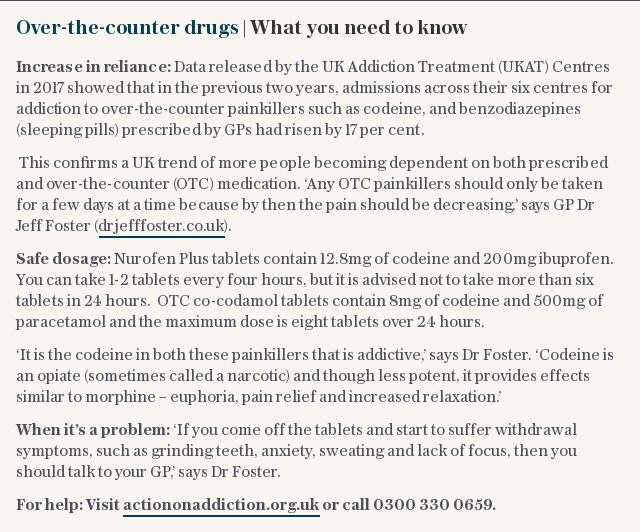Over-the-counter codeine could be banned as fears of UK opioid addiction crisis grow

Over-the-counter codeine could be banned amid fears of an opioid addiction crisis, a health watchdog has revealed.
The Medicines and Healthcare products Regulatory Agency (MHRA) has confirmed that it is considering reclassifying common painkillers such as co-codamol, co-codaprin and Nurofen Plus to make them unavailable except with a prescription.
The possible move would form part of a mounting crackdown on the inappropriate use of painkillers following a report last year that indicated Britain is sliding towards a US-style opioid crisis.
A highly addictive opiate, codeine in its more potent form currently requires a prescription. However, when combined with other painkilling drugs, such as paracetamol or ibuprofen, or in liquid form as a cough remedy, it is available over the counter.
Although they are not intended for chronic pain and are supposed to be used for a maximum of three days, there is growing concern that millions have become addicted to opioids as a long-term solution.
In September last year, Public Health England (PHE) produced a report revealing that one in four adults in the UK is being prescribed potentially addictive drugs, with half of them still hooked a year later.
The first official mapping of dependence on heavy painkillers – described by Matt Hancock, the Health Secretary, as "disturbing" – found that 5.6 million people were on opioid pain medications.
An MHRA spokesman told Pulse: "The MHRA is keeping the safety of OTC products containing codeine under review and will consider other interventions, including the possibility of reclassifying all opioid-based painkillers as prescription only as necessary."
It comes two days after the National Institute of Health and Care Excellence (Nice) issued new guidance warning doctors not to prescribe paracetamol, ibuprofen and opioid drugs for long-term pain.
The agency, responsible for setting clinical standards in the NHS, said there was "little or no evidence" that the medicines improved quality of life.
Although its guidelines did not explicitly mention over-the-counter medication, Nice subsequently confirmed that opioids should not be offered to anyone over the age of 16 to manage long-term pain.

However, GP leaders have suggested that the recommended alternatives to painkillers, such as acupuncture and exercise, are not readily available to patients.
More than 20 million people in the UK are thought to be suffering from chronic pain, defined as lasting or recurring for more than three months.
Codeine comes in tablet form, as a liquid to swallow or as an injection. Codeine injections are usually only given in hospital.
The drug is available over the counter in lower strengths when combined with paracetamol, in the form of co-codamol, or aspirin, in the form of co-codaprin, or ibuprofen, sold as Nurofen Plus.
The MHRA said these should be purchased "under the supervision of a pharmacist".
The 2019 PHE report found that in England, almost 12 million adults a year are being prescribed drugs on which they may become dependent.

Up to a third of patients had been on them for at least three years, including 930,000 people on antidepressants, 540,000 on opioids, and 160,000 on gabapentinoids.
Often patients were taking more than one type of treatment, with more than half a million people on a cocktail of opioids and antidepressants.
Mr Hancock said at the time: "I refuse to let this escalate to the level seen in the United States. This review is a wake-up call."

 Yahoo News
Yahoo News 